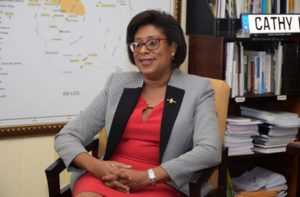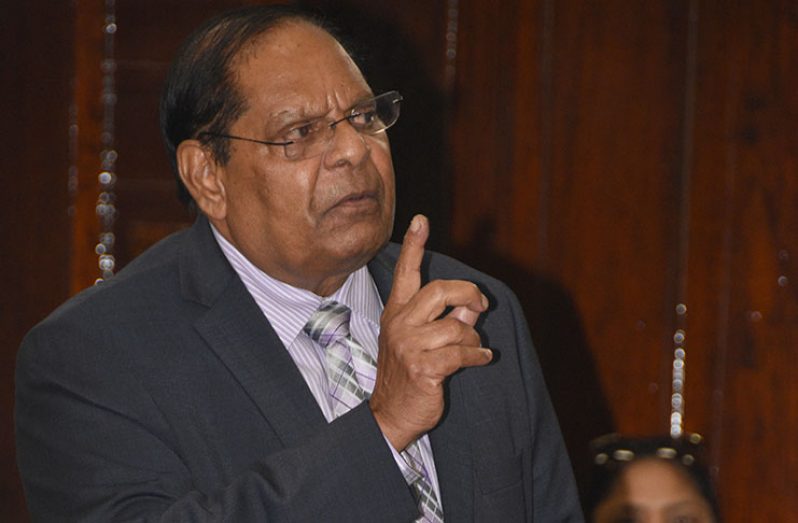GOVERNMENT has opted to make necessary adjustments to the contentious sedition clause of the country’s Cybercrime Bill, passed on Friday, to protect free speech, citizens and the State from criminal abuse of the Internet.
These adjustments resulted in amendments to two clauses which had allegedly infringed freedom of the press and freedom of expression. During his debate of the bill last Friday at the sitting of the National Assembly, Prime Minster Moses Nagamootoo had read out loud a letter from Reporters Without Borders on June 6, 2018 whereby the body stated its support for the principle of the bill.
“We do not dispute the principle of this law. The Internet should not escape government regulation altogether and we believe that it is perfectly legitimate to proscribe conduct such as computer fraud, identity theft and, even more serious, child pornography,” the letter stated.
In turn, Nagamootoo assured the body that objections to the sedition clause would be considered and during his address said: “The Government has listened to comments on this bill and the Government has responded to aspects of these comments and has decided that the sedition aspect of the bill should be removed.”
He also told the house that he would remove provisions from the county’s criminal law which deal with seditious libel in order to protect freedom of expression and press freedom. Nonetheless, the Friday evening debate was not short of criticism from the Opposition which poked holes in the bill stating that it was undemocratic.
Nagamootoo in turn pointed to the Stabroek News April 30, 2018 edition whereby the Opposition Leader, himself, admitted that the party had “dropped the ball” with their absence from meetings of the Select Committee dealing with the bill. Opposition Members of Parliament Clement Rohee, Anil Nandlall, Gillian Persaud and Opposition Chief Whip Gail Teixeira were absent from the meeting from July 2017 which, in turn, led to an apparent lack of knowledge by the PPP members about the Bill.
“Here is a case where, a piece of proposed legislation as important as this one as we are told by all members of the house, had gone to a select committee and leader of the opposition said that the opposition members of the Select Committee ‘dropped the ball’,” he said, later adding:

“Why is it we have this manifestation of disappointment with the government that the government did something in the broad light of day that surprised and stunned the opposition? It is because they did not come to do the work for which they are paid.”
The Prime Minister caused the house to reminisce on 1966 with the arrival of Internet in Guyana where the then PPP Government had, too, thought it best to put mechanisms in place to avoid its misuse in forms such as child pornography. “Today this bill before us…in conjunction with the amendments that have been tabled is intended to do just that, to be able to combat the abuse of Internet not the use of it,” he said.
Nagamootoo added that since in 1990 the United Nations (UN) General Assembly adopted a resolution on Computer Crime Law and in 1997 the most powerful countries, then, enacted an action plan to address the issues of computer-generated crime.
In 2001 he said the Council of Europe adopted and passed the convention on Cyber Crime and specified internet criminal behaviours and by 2002 the Commonwealth provided a model law to address the same issue. “We have lagged behind in bringing a law to protect our citizens, our state from crimes generated by the use of a computer and therefore the attempt to mix this with all types of expressions is misleading,” Nagamootoo said.
Meanwhile, in her address to the house, Telecommunications Minister Cathy Hughes also berated the opposition for failing to sufficiently make representations to the Bill during the two years it was in Select Committee.
“The Select Committee was the mechanism by which you could come and bring all your concerns. It is unacceptable for you to come now and say that you will not participate,” she reproved the Opposition.
The Minister pointed out that the bill would help to protect over 300,000 Guyanese in use of or with access to the Internet. She also defended the high fines of up to $20M or multi-triple-year imprisonment for cybercrimes on the State under the Bill, commenting: “Some of us and many on the opposition side have mentioned that this seems to be an exceedingly harsh penalty but the punishment fits the crime as any attack on the state in any way that it comes, in any shape or form, cannot be tolerated.”
The Cyber Crime Bill had stirred up much public debate since its emergence into the public scrutiny but with the amendments in light of several concerns raised, the Government has reiterated its commitment to protecting its citizens from the possible negatives of the internet.




.png)









